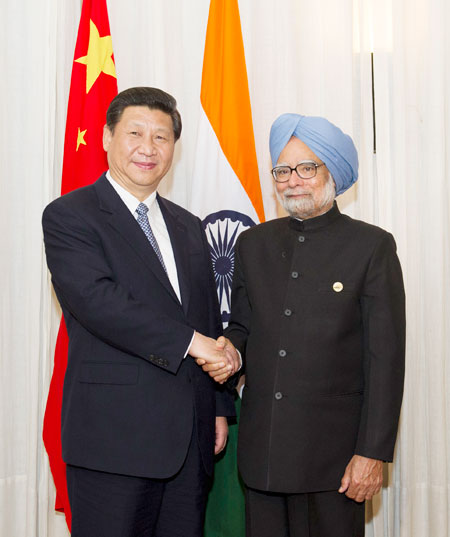Bilateral relations a top priority
Updated: 2013-03-28 23:55
By Zhao Shengnan in Beijing and Wu Jiao in Durban, South Africa (China Daily)
|
||||||||
Dialogue and cooperation vital, Xi says to Indian, Brazilian leaders
 |
|
President Xi Jinping meets Indian Prime Minister Manmohan Singh at the BRICS Summit in Durban, South Africa, on Wednesday. Huang Jingwen / Xinhua |
Top Chinese and Indian leaders on Wednesday made assurances that the development of bilateral relations is among the top priorities of each other's foreign policy and pledged to safeguard peace in their border areas.
China commits itself to pushing forward the strategic cooperative partnership, and the world needs the common development of the two largest developing countries, President Xi Jinping told Indian Prime Minister Manmohan Singh.
Xi made the remarks on the sidelines of the fifth summit of BRICS - Brazil, Russia, India, China and South Africa - in Durban, South Africa.
It was the first high-level China-India meeting since Xi became president on March 14.
Singh's statement during the meeting and Xi's earlier proposals to enhance relations with India mapped out the development of ties over the next decade, said Fu Xiaoqiang, an expert on South Asian studies at the China Institutes of Contemporary International Relations.
The border issue remains the key but tough task for China-India relations, while they try to prevent the issue hindering cooperation in politics and the economy, Fu said.
Xi urged both sides to use special representatives to strive for a fair, rational framework that can lead to a solution to the issue as soon as possible.
India will abide by political guidelines set by both sides and seek a solution to the border issue with a commitment to safeguarding peace, Singh said.
Since 2003, more than a dozen rounds of talks have been launched to resolve the border disputes, which led to a brief war in 1962. But ties have still been occasionally strained by the issue and overshadowed by closer India-US relations amid Washington's accelerating Asia "pivot" policy.
Xi called on the two countries to maintain high-level contact, broaden cooperation between their armed forces, deepen mutual military and security trust, and discuss cooperation on large-scale infrastructure projects.
Singh said his country, which adheres to an independent foreign policy, will not be used as a tool to contain China. Instead, the country is willing to make concerted efforts with China to show the world that they are cooperative partners instead of rivals.
He also voiced the hope that India and China would respect each other's core interests and major concerns, deepen mutual strategic trust, strengthen coordination and cooperation on international affairs, and safeguard peace and stability in the region and the world at large.
India recognizes the Tibet autonomous region is a part of Chinese territory and that India will not allow Tibetans to conduct political activities against China in India, he added.
Ye Hailin, a professor in international relations at the Chinese Academy of Social Sciences, said Singh's remarks demonstrate India's diplomatic independence, and the direction of China-India relations will depend on the two countries' interactions.
In another development, Xi met his Brazilian counterpart Dilma Rousseff on the sidelines of the BRICS summit on Wednesday, saying boosting ties with Brazil is China's firm strategic choice.
Noting Brazil is the first developing country to forge a strategic partnership with China, Xi urged the two sides to guide their enterprises toward settling their disputes in an appropriate way.
Rousseff said Brazil sees eye to eye with China, the largest trade partner and export market for Brazil, on the necessity for further cooperation, welcoming Chinese enterprises participating in Brazil's communications, transportation and other large-scale infrastructure projects, and encouraging financial cooperation.
Xinhua contributed to this story.

 Li Na on Time cover, makes influential 100 list
Li Na on Time cover, makes influential 100 list
 FBI releases photos of 2 Boston bombings suspects
FBI releases photos of 2 Boston bombings suspects
 World's wackiest hairstyles
World's wackiest hairstyles
 Sandstorms strike Northwest China
Sandstorms strike Northwest China
 Never-seen photos of Madonna on display
Never-seen photos of Madonna on display
 H7N9 outbreak linked to waterfowl migration
H7N9 outbreak linked to waterfowl migration
 Dozens feared dead in Texas plant blast
Dozens feared dead in Texas plant blast
 Venezuelan court rules out manual votes counting
Venezuelan court rules out manual votes counting
Most Viewed
Editor's Picks

|

|

|

|

|

|
Today's Top News
Boston bombing suspect reported cornered on boat
7.0-magnitude quake hits Sichuan
Cross-talk artist helps to spread the word
'Green' awareness levels drop in Beijing
Palace Museum spruces up
First couple on Time's list of most influential
H7N9 flu transmission studied
Trading channels 'need to broaden'
US Weekly

|

|







